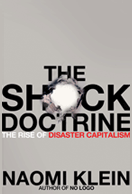The Shock Doctrine

Disaster Capitalism in Action: privatizations
Conservatives Start Pushing to Privatize Freddie Mac and Fannie Mae
David M. Abromowitz, Center for American Progress, September 9, 2008
"If one concludes that the current housing crisis results heavily from laissez-faire ideology trumping common sense protection of safety, soundness, and consumers, then the logical remedy would be to require more effective regulation....
"Yet conservatives are already pushing to 'shrink-the-GSEs,' perhaps as a precursor to fully privatize the secondary market for home mortgages....
"As [Milton] Friedman went on to note about times of crisis, oftentimes 'the politically impossible becomes the politically inevitable.' The housing market plunge appears to be just such a crisis, demanding a progressive consensus be forged soon on the road to follow."
U.S. Infrastructure Crisis Paves Path for Privatizations
Jenny Anderson, New York Times, August 26, 2008
"Cleaning up road kill and maintaining runways may not sound like cutting-edge investments. But banks and funds with big money seem to think so. Reeling from more exotic investments that imploded during the credit crisis, Kohlberg Kravis Roberts, the Carlyle Group, Goldman Sachs, Morgan Stanley and Credit Suisse are among the investors who have amassed an estimated $250 billion war chest — much of it raised in the last two years —to finance a tidal wave of infrastructure projects in the United States and overseas.
"Their strategy is gaining steam in the United States as federal, state and local governments previously wary of private funds struggle under mounting deficits that have curbed their ability to improve crumbling roads, bridges and even airports with taxpayer money.
"With politicians like Gov. Arnold Schwarzenegger of California warning of a national infrastructure crisis, public resistance to private financing may start to ease. 'Budget gaps are starting to increase the viability of public-private partnerships,' said Norman Y. Mineta, a former secretary of transportation who was recently hired by Credit Suisse as a senior adviser to such deals."
Mexican Voters Reject Increasing the Role of Private Oil Companies
Marla Dickerson, Los Angeles Times, July 29, 2008
"Turnout was light, but voters in a nonbinding referendum gave an overwhelming "no" to President Felipe Calderon's proposal to give private firms a bigger role in Mexico's government-controlled petroleum industry....
Mexico is the world's sixth-largest petroleum producer, and the industry is the nation's largest taxpayer....
"Calderon in April sent legislation to Congress that would loosen some restrictions on Pemex, enabling it to team up with foreign oil companies to extract the nation's undersea oil. His plan also calls for more private investment in areas such as refining and storage. Opponents say Calderon's real objective is to privatize Pemex, a charge the president denies."
Chileans Protest Government Attempts to Further Privatize Education
Reuters, Reuters, July 8, 2008
"Teachers and students want President Michelle Bachelet to withdraw an education bill from Congress under which an education superintendent would regulate government funds for public schools. Protesters say the bill does not address concerns that Chile's education system is being privatized, and they believe that the education of poorer students will suffer at ill-funded state schools as a result of the measure....
"In June, thousands of teachers and students protested against the bill, which has been passed by the lower house of congress. The senate has yet to vote on it. The bill would replace a law in place since the end of Augusto Pinochet's 1973-1990 dictatorship."
See Upside Down World for more analysis on the education bill and the protests.
Pennsylvania Retakes Control of 6 Privatized Schools in Philadelphia
Keith B. Richburg, Washington Post, June 29, 2008
"Six years ago, the Philadelphia School District embarked on what was considered the country's boldest education privatization experiment, putting 38 schools under private management to see if the free market could educate children more efficiently than the government. If it worked, the plan seemed likely to become a model for other struggling urban school districts, such as Washington's, suffering from a lack of funding, decaying buildings and abysmal student test scores.
"This month, the experiment suffered a severe setback, as the state commission overseeing Philadelphia's schools voted to take back control of six of the privatized schools, while warning 20 others that they had a year to show progress or they, too, would revert to district control."
Israel is Privatizing Security at Checkpoints in the West Bank
Tobias Buckin, Financial Times, June 4, 2008
"Israel's ministry of defence started using private security companies at checkpoints more than two years ago but their presence has become visible only very recently. According to Mr. Dror, all 30 crossings through which Palestinians can enter Israel now use private security contractors, and at least one has been handed over completely to private companies. For the time being, the role of private security contractors will be confined to what Israel identifies as border posts with the West Bank.
"The government refuses to say how many private workers man the checkpoints, or how much it spends on their salaries. But Mr Dror says there are 'several hundred' private guards employed - a number that is certain to rise sharply. 'By the end of the year all the people will be civilians,' he says."
Many Insurance Companies Now Offering Private Firefighting Services for Wealthy
Emmet Pierce, San Diego Union-Tribune, March 25, 2008
"Now other companies that provide homeowner's insurance are identifying supplemental fire-protection services as a business opportunity. The Chubb Group of Insurance Companies recently announced a program that includes the spraying of fire-blocking gel during wildfires, and Fireman's Fund also plans to enter the market....
"'We are seeing more of that kind of above-and-beyond service in high-end markets,' said Candysse Miller, executive director of the Insurance Information Network of California. But as a new wildfire season approaches, some public safety officials worry that private firefighting programs could interfere with their efforts to combat flames. Other observers worry that two tiers of fire protection may be emerging: one for the general population and one for the affluent."
Sovereign Deed: Fully Privatized Disaster Rescue for "Country Club" Fees
Harbor Light News, Harbor Light News, October 31, 2007
"A company that plans to offer national catastrophic disaster survival assistance through private memberships will locate one of its national response centers at Pellston Regional Airport with a reported investment of up to $79 million, if all goes according to plan....Sovereign Deed's target market are people living in major metropolitan areas. Members would get one-on-one personal planning assistance, everything from analysis of potential threats and disasters to individual survival packs, provisioning and evacuation planning, [Executive Vice President Richard] Mills said....
"Asked about the cost of membership, Mills called it a 'country club style of membership.' There is an initial onetime fee of $50,000 and annual fees of $15,000. Mills said the cost is so high because it is a brand-new industry. He said once the infrastructure is in place, 'if you buy a car, you will have this service. But it ain't happening over night.'"
See also:
* The Michigan Messenger's fantastic coverage of Sovereign Deed














